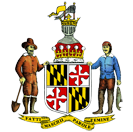| Document as described in William Reese Company catalog:
This document, in a contemporary secretarial hand, constitutes the response of Cecil Calvert, the second Lord Baltimore and proprietor of maryland, to charges that he was not maintaining and defending the Protestant religion in his colony. Cecil Calvert's father, George Calvert, the first Lord Baltimore, was granted a patent to the Chesapeake Bay region in 1632. The Calverts were Catholics and Maryland was established partly as a refuge for Catholics persecuted in England. After the death of the first lord Baltimore, his son, Cecil, assumed proprietorship of the colony in England, while George Calvert's other son, Leonard, ruled as governor in America. The conflicts raging in England between the King and Parliament had their manifestations in the American colonies, including struggles between Protestant Virginia and predominantly Catholic Maryland over contested lands, such as Kent Island in the Chesapeake. In 1648-49, in order to ease tensions, Cecil Calvert encouraged Protestant settlements in Maryland. The present document grows out of the continuing tensions between Protestants and Catholics in the Chesapeake region.
The accusations against the Baltimores were brought before the Committee of the Council of State by Capt. Richard Ingle (ca. 1609-53), a Protestant Parliamentarian, pirate, and rebel. Since his first arrival in Maryland in 1642, Ingle had been a thorn in the side of the Baltimores and the Maryland colonial authorities, and he contributed greatly to the instability of that colony in the 1640s. Ingle was several times accused of treason or piracy, was instrumental in the capture of Kent Island from maryland in 1645, ransacked the homes of many of the wealthiest Marylanders, and captured St. Thomas' Fort. In all, "there is no doubt that his presence in the early days of Maryland ultimately resulted in a period of turmoil in the colony that leasted nearly two years" (ANB). That turmoil reached England when Ingle brought an action against the Baltimores in 1646, seeking to disallow their legal title to Maryland. He argued that the Baltimores were bound by their royal patent to maintain the Protestant religion in Maryland, that they had not done so, that Protestant estates in Maryland had been seized, and that Ingle personally had been persecuted. Given the religious zeal of the Commonwealth, this put Baltimore in a perilous situation.
Ingle's complaint was heard by the Council of State on Feb. 25, 1649, and the present document constitutes Cecil Calvert's pre-hearing response to Ingle's charges. The second Lord Baltimore states that at the time King Charles I granted the proprietorship of Maryland to his family, it was well known that they were "Recusants," or Catholics. He claims that the royal charter "obliged him to mayntayne [sic] no particular profession in religion" and points out that his Deputy and Secretary in Maryland are know to be Protestants. He also states that in Maryland "there is a law published there for the freedom of religion to allsuch as profess to believe in Jesus Christ," referring no doubt to the "Act Concerning Religion" that would be passed by the Maryland colonial assembly in April, 1649, which would constitute the first law guaranteeing religious freedom in the British colonies. Baltimore goes on to assert that Ingle had behaved "in a follonious and pyraticall way, about four years tyme (without any authority or warrant for soo doing) plundered his plantation and most barbarously used many of the inhabitants there [sic]". Baltimore maintains that he is prepared to call witnesses currently in England, and to bring over witnesses from the colonies, who could attest to Ingle's actions and to the religious freedom practiced in Maryland. Lord Baltimore concludes by appealing to the Council for a continued toleration of his rights as a Catholic Recusant: "He humbly desyres, and hopes, that his Religion shall not now bee deemed a sufficient cause to deprive him of his inheritance in those parts or from the law or government of his colony there. For the government was ye chiefest encouragement he had to adventure a great part of his fortune thereon. There being no laws at ye tyme of his grant to prohibit any Recusant from having ye command of his own in so desert a place of the world [sic]." In 1651, two years after the hearing, Ingle's claims and petitions were found to be "unprovided to prove his charges" (ANB) and the case was dismissed.
This manuscript is from the Fairfax family collection. The Fairfaxes had vast interests in colonial Virginia, which were often at odds with the Baltimore family. A fascinating and central document in the religous history of Maryland and the American colonies, in which Lord Baltimore publicly defends freedom of religion in his colony, the first of the American colonies to allow it. A seminal American manuscript.
ANB 11, pp. 654-55. |
